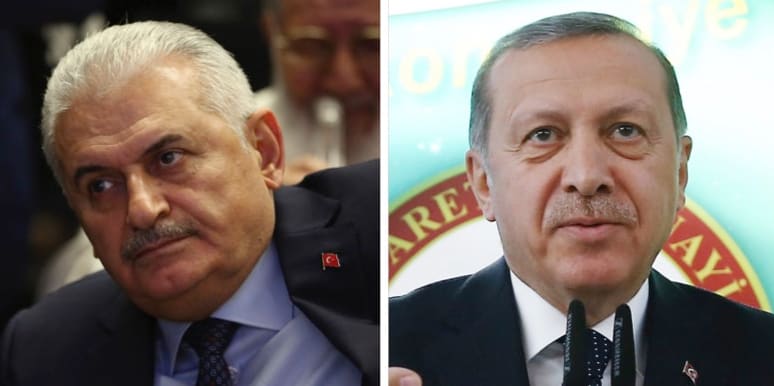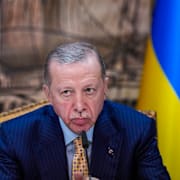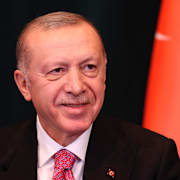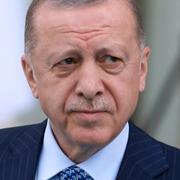
Efter maktstriden: Han blir ny premiärminister
Turkiets transportminister Binali Yildirim har valts som ledare för regeringspartiet AKP och kommer därmed att bli ny premiärminister. Det rapporterar nyhetsbyrån AFP.
Yildirim var den enda kandidaten som var nominerad på kongressen i Ankara i dag. Han kommer att ersätta Ahmet Davutoglu, som avgick efter en maktkamp med Turkiets auktoritära ledare Recep Tayyip Erdogan.
Yildirim väntas stärka Erdogans maktposition.
Huvudpersonerna i maktstriden
bakgrund
Recep Tayyip Erdoğan
Wikipedia (sv)
Recep Tayyip Erdoğan [ˈrɛdʒɛp ˈtɑːjip ˈɛrdɔːɑn], född 26 februari 1954 i Kasımpaşa i Istanbul, är Turkiets president sedan den 28 augusti 2014. Han var tidigare Turkiets premiärminister från den 14 mars 2003 fram till dess att han tillträdde som president. Han var partiledare för Rättvise- och utvecklingspartiet som han grundade från 2001 till 2014, ett parti som innehar en majoritet i den turkiska nationalförsamlingen. Erdoğan var Istanbuls borgmästare mellan 1994 och 1998. Han utexaminerades år 1981 från Marmara University och var också en semi-professionell fotbollsspelare från 1969 till 1982.
Erdoğan valdes till borgmästare för Istanbul i de lokala valen den 27 mars 1994. Han avgick från sitt ämbete under tvång och dömdes till fängelse för att han deklamerat en dikt under ett offentlig tal i provinsen Siirt den 12 december 1997, med orden "moskéerna är våra baracker, de troende är våra soldater och minareter är våra vapen". Dikten påstås ha citerats ur en bok publicerad av ett statligt företag och att boken hade rekommenderat till lärare av utbildningsministeriet. Efter sex månader i fängelse grundade Erdoğan Rättvise- och utvecklingspartiet (AKP) den 14 augusti 2001. Från dess första år blev AKP den mest offentligt stödda politiska rörelsen i Turkiet. I det allmänna valet 2002 segrade partiet med nästan två tredjedelar av platserna i parlamentet och kunde därmed bilda den första enpartiregeringen i Turkiet på 9 år. Det har kritiserats i det starkt sekulära Turkiet för att förespråka en islamisk stat, men anses av sina egna anhängare vara ett moderat muslimskt parti.
Som premiärminister genomförde Erdoğan ett flertal reformer. 45 år efter att Turkiet undertecknat ett associeringsavtal med EU, började förhandlingarna om Turkiets anslutning till EU under Erdoğans ämbetstid. Parallellt med detta, inflationen, som i årtionden hade försvagat och drabbat landets ekonomi, kunde tas under kontroll och den turkiska liran återfick sin forna prestige genom eliminering av sex nollor.
Räntorna sänktes och inkomsten per capita ökade markant. AKP vann valet 2007, vilket gjorde det till första gången på 52 år som ett parti i regeringsställning ökade sina röster för en andra mandatperiod. I valen 2011 omvaldes han för en tredje mandatperiod och Erdoğan fortsatte som premiärminister. Erdoğan är det längst sittande premiärministern i Turkiet sedan İsmet İnönü, samt det längst sittande premiärministern i sammanhängande period i landets historia.
Den 1 juli 2014 nominerade AKP honom till deras kandidat i presidentvalet den 10 augusti 2014, varvid han med omkring 52 % av rösterna valdes till Turkiets förste direkt folkvalde president, med tillträde till ämbetet 28 augusti 2014.
bakgrund
Ahmet Davutoğlu
Wikipedia (en)
Ahmet Davutoğlu (Turkish pronunciation: [ahˈmet daˈvutoːɫu]; born 26 February 1959) is a Turkish academic, politician and former diplomat who is the Prime Minister of Turkey since 28 August 2014 and the leader of the Justice and Development Party (AKP) since 27 August 2014. He previously served as the Minister of Foreign Affairs from 2009 to 2014 and as chief advisor to Prime Minister Recep Tayyip Erdoğan from 2003 to 2009. He was elected as an AKP Member of Parliament for Konya in the 2011 general election and was re-elected as an MP in both the June and November 2015 general elections. He resigned as AKP leader and Prime Minister on 5 May 2016.
Following the election of serving Prime Minister and AKP leader Recep Tayyip Erdoğan as the 12th President of Turkey, Davutoğlu was announced by the AKP Central Executive Committee as a candidate for the party leadership. He was unanimously elected as leader unopposed during the first AKP extraordinary congress and consequently succeed Erdoğan as prime minister, forming the 62nd Government of the Turkish Republic. His cabinet has been dominated by Erdoğan's close allies such as Yalçın Akdoğan, leading to speculation that he will take a docile approach as prime minister while Erdoğan continues to pursue his political agenda as president. in the June 2015 general election, the AKP lost its parliamentary majority in Parliament though remained as the largest party. Davutoğlu's government subsequently resigned but stayed in power until a new government could be formed. After presiding over a series of unsuccessful coalition negotiations with opposition parties, Davutoğlu was tasked with forming Turkey's first-ever interim election government, which presided over snap elections scheduled for November 2015. The AKP regained its parliamentary majority in November after a landslide victory, with Davutoğlu subsequently forming his third government.
Following a deterioration in relations between Davutoğlu and Erdoğan over disagreements regarding parliamentary candidate lists, government policy and the implementation of an executive presidential system of government, Davutoğlu announced his resignation as AKP leader and Prime Minister seven months after his November 2015 general election victory. He announced that an Extraordinary party Congress would be held on 22 May 2016 and that he would not stand for re-election for the party leadership.
As Prime Minister, Davutoğlu's administration has overseen an escalation of conflict between the government and the Kurdistan Workers' Party (PKK) after a two-year ceasefire broke down in mid 2015. His government originally authorised airstrikes against both PKK and Islamic State of Iraq and the Levant (ISIL) positions on 20 July after a suicide bombing killed 32 people in the south-eastern town of Suruç. The government's offensive against ISIL came after sustained criticism by allies such as the United States over Turkey's lack of action against the group, though the political opposition accused Davutoğlu of sparking the conflict deliberately to win back votes and regain a parliamentary majority in the November 2015 snap election. His government has also presided over the ongoing political conflict with the Gülen Movement, the spillover effects of the Syrian Civil War across the border with Turkey as well as the European migrant crisis that emerged as a result. Although his foreign policy outlook has been described as Neo-Ottoman or Pan-Islamist, Davutoğlu has made Turkey's ascension bid to the European Union a strategic target for his government. He has been criticised for failing to tackle political corruption and for growing government authoritarianism, with a new national security bill in early 2015 causing opposition commentators to accuse his government of turning Turkey into a police state.
bakgrund
Binali Yildirim
Wikipedia (en)
Binali Yıldırım (Turkish pronunciation: [binaːˌli jɯldɯˈɾɯm]; born 20 December 1955) is a Turkish politician who is the presumptive 27th Prime Minister of Turkey as of 19 May 2016, due to take office as Leader of the Justice and Development Party (AK Party) at the party's 2nd Extraordinary Congress on 22 May 2016. He previously served as the Minister of Transport, Maritime and Communication almost continuously from 2002 to 2013 and again between 2015 and 2016. Between 2014 and 2015, he served as senior advisor to President Recep Tayyip Erdoğan.
Yıldırım served as the Chairman of the Board of Directors of İstanbul Fast Ferries Company (İDO) from 1994 to 2000 before being elected as an AK Party Member of Parliament for İstanbul's first electoral district during the 2002 general election. He was appointed as Minister of Transport by Prime Minister Abdullah Gül and continued in office after Erdoğan became Prime Minister in 2003. As Transport Minister, he presided over numerous projects such as Marmaray, high-speed rail lines and an expansion in the country's airport and road facilities, though received heavy criticism and calls for his resignation following the Pamukova train derailment in 2004. In 2011, the portfolios of Maritime and Communications were merged with the Ministry of Transport, with Yıldırım becoming the Minister of Transport, Maritime and Communication.
Leaving office in a cabinet reshuffle in 2013, Yıldırım ran as the AK Party candidate for Mayor of İzmir in the 2014 local elections but lost to the incumbent Republican People's Party (CHP) candidate Aziz Kocaoğlu. He was appointed as special advisor to Erdoğan in June 2014 and left Parliament in the June 2015 general election due to the AK Party's three-term rule for its sitting MPs. He was re-appointed as Transport Minister by Prime Minister Ahmet Davutoğlu after being re-elected to Parliament in the November 2015 general election. Following Davutoğlu's resignation as party leader due to a breakdown in relations with President Erdoğan on 5 May 2016, Yıldırım was announced as the AK Party's next leader by the party central executive committee on 19 May and is due to be formally elected unopposed during the party's 2nd Extraordinary Congress on 22 May 2016. He will subsequently form the country's 65th government and become Prime Minister in June 2016.
As a staunch supporter of Erdoğan, Yıldırım is expected to act as a 'low-profile' Prime Minister and spearhead a transition from a parliamentary system of government to an executive presidency, which will delegate greater powers to Erdoğan and the Office of the President. In 2013, Yıldırım was implicated in a government corruption scandal, with the financial and social activities of his family members also coming under scrutiny. He has caused controversy over his defence of greater government surveillance and his support for sex segregation.
Omni är politiskt obundna och oberoende. Vi strävar efter att ge fler perspektiv på nyheterna. Har du frågor eller synpunkter kring vår rapportering? Kontakta redaktionen



